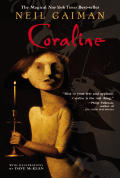
| Publisher: | HarperTrophy |
| Copyright: | 2002 |
| Printing: | 2003 |
| ISBN: | 0-380-80734-3 |
| Format: | Trade paperback |
| Pages: | 163 |
Neil Gaiman is one of the most versatile writers in the SF genre. He's written everything from comics to adult novels, short stories to screenplays, films to children's picture books. Coraline is one of his entries in children's fiction, a novella-length story which won a Hugo and Nebula along with a large pile of children's book awards. It's gotten rave reviews and a ton of attention.
Given that lead-in, I was expecting the book to blow me away. It didn't, nor did it catch my attention as much as Gaiman's other work for adults. It lacks much mythic complexity or worldbuilding, and it mostly lacks Gaiman's narrative profundity and quotability. This is, for Gaiman, a very straightforward sort of book. It has a touch of nightmarish horror, a determined child protagonist, a standard children's-book setup, and a happy ending. It's a solid children's horror story to be sure; the alternate world and alternative parents are suitably creepy and psychologically appropriate. But it did strike me as a bit overhyped.
It does have one feature, though, that's more important than it appears at first glance. Coraline doesn't act like the protagonists in most children's books.
Gaiman has a talent for creating characters who act like themselves while failing to meet stock narrative expectations. Coraline is not a brave, adventurous child hero who discovers some great personal insight or hidden talent. Coraline is a thoughtful, practical child who picks her battles, takes a matter-of-fact attitude towards the world, and reacts to horror with the most realistic sort of bravery I've seen in a horror novel. She does what she has to do even thought she's afraid, she talks herself into doing the right thing, and she does so without histrionics or overblown narration. Gaiman doesn't telegraph the scary parts the way many books (even for adults) do. He trusts the reader to know when events are turning dark and focuses on what Coraline is doing. This is a factual book full of specific physical detail, with the emotion lurking implied between the words.
As a result, the emotion of the story feels drier and subtler than one might expect, and Coraline comes away as one of the most empowered child protagonists I've seen. She's not swept up in any grand prophecy, she never breaks down into histrionics, she isn't anyone special she didn't know about at the start of the story, and by the end of the story one gets the impression that the world has learned something about Coraline rather than Coraline learning something about the world. No one steps in to solve her problems for her. The wise guardian figure or the inscrutable teacher appear only in the form of a cat who's watching out for his own interests. Instead, Coraline faces the world with an unflinching honesty, follows through when she gets a good idea, and pays attention.
Coraline had a single heartbeat in which to react. She could only think of two things to do. Either she could screan and try to run away, and be chased around a badly lit cellar by the huge grub thing, be chased until it caught her. Or she could do something else.
So she did something else.
This passage sums up both the style and the type of solutions found in Coraline. Neither the book nor its heroine trumpet their successes. They just do something else, slightly askew from the horror tropes, and slightly more effective.
Gaiman can be disturbingly creepy when he tries, and there are moments of description here that raise goosebumps if one dwells on them. Apart from that, though, the book isn't horribly frightening. Gaiman does build plot tension, but keeping you on the edge of your seat or jumping at shadows doesn't seem to be the goal. Coraline is too matter-of-fact and clearly competent for the reader to get too nervous. That, I think, is where Coraline does stand out from the pack; it is refreshingly unwilling to take the cheap emotional button-pushing route.
This book didn't entrance me to the degree that it apparently did many others. It's a solid story, but I'm not sure I'd seek it out; I recommend all of Gaiman's adult novels more highly (at least for the adult reader). But Coraline is an excellent protagonist. If you run across the book, it's worth reading just for her.
Reviewed: 2007-03-10